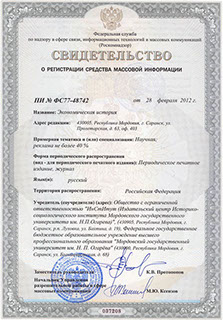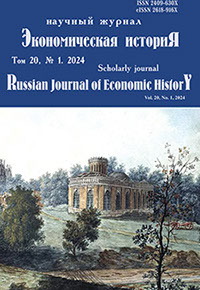Экономическая историЯ
Russian Journal of Economic History
ISSN 2409-630X (Print)
ISSN 2618-916X (Online)
Expert board:
- Scientific Council of RAS on economic history;
- Research and Educational Center «The economic history of Central Russia and the Middle Volga region» of Ogarev Mordovia State University;
- Center of Economic History of Lomonosov Moscow State University
Navigation
Certificate of registration

ISSN 2409-630X (Print), ISSN 2618-916X (Online)
DOI: 10.15507/2409-630X.064.020.202401.028-043
Veniamin A. Nekrasov1, Dmitry S. Plokhoy2, Ivan A. Chukanov3
1, 2, 3 Ulyanovsk State Pedagogical University named after I. N. Ulyanov (Ulyanovsk, Russia)
1 e-mail: vnekrasof@yandex.ru
2 e-mail: bedkazak@icloud.com
3 e-mail: chia58@rambler.ru
Investigation of Crimes in Financial Institutions in the 19th Century (Based on Materials of the Simbirsk Province)
Abstract
Introduction. The article on a wide archival base analyzes the process of forming urban public banks and investigating crimes in the banking sector in the 19th century. The article reveals the main reasons for crimes and abuses in the banking sector, which were caused, firstly, by the special status of city public banks, and secondly, by weak control over their activities by the city government bodies (city councils) in whose jurisdiction they were. The background of the emergence of commercial private and joint-stock banks in Russia is briefly described.
The main area of research was related to investigations of criminal activities in the banking sector, the use of methods for solving crimes in the economic sphere existing at that time on the effectiveness of the investigation of criminal acts in the banking sector in the Simbirsk and Saratov province.
Materials and Methods. The work widely used the historical and legal method, which made it possible to consider the investigative process in the banking sector through the prism of the evolution of the legislation of the Russian Empire on investigative bodies with the definition of socio-economic conditions affecting the course and effectiveness of investigations in the banking sector. Modernization theory was also actively used, which made it possible to determine the main directions of evolution of the work of judicial investigators during the rapid development of the credit and banking sector in the country during its socio-economic reform during the period of great reforms carried out by the government of Emperor Alexander II.
Results. As noted in the above material, the disclosure of crimes committed by the management and management of city public banks were the most difficult to solve if we take the economic sphere as a whole. The authors reveal the reasons for the difficulties faced by the judicial investigators of the District Courts in investigating such crimes, created during the evolution of the system of joint-stock commercial banks in Russia, and also analyze the discussion that arose in the law enforcement environment among legal scholars about the most applicable and effective forms of investigative work in exposing such crimes.
Discussion and Conclusion. The main reasons for the low overall performance in solving crimes in the credit and financial sector were the low general and specific economic qualifications of judicial investigators, as well as the erroneous policy of the management of the District Courts, which were sent by the least experienced specialists to investigate the most time-consuming in the investigation of economic crimes, and especially offenses in the banking sector. The authors point to a huge labor intensity in investigating such cases, when checking a huge number of reports, balance sheets and other financial documents required the involvement of a significant number of additional assistants qualified in the banking sector. Particular emphasis is placed on the fact that during the period under review, a system of moral and material incentives for specialists involved in investigative actions during the investigation of the most complex crimes was not established.
There was a hidden reluctance of the city and provincial authorities to bring such investigations to the end, since such financial institutions could not be withdrawn from the financial turnover of provinces and cities for a long time, and their imminent bankruptcy and even temporary closure for the period of the investigation necessarily led to severe socio-economic consequences not only within the framework of a single city, but also the region as a whole. Some leaders of cities and urban dumas were afraid that the complete exposure and prosecution of criminal schemes would inevitably highlight their negative participation in the commission of these crimes.
Huge difficulties in the investigation of such crimes were also caused by a misunderstanding on the part of the higher authorities of the complexity and public significance of the ongoing investigations, which required the judicial investigators accountable to them to complete the investigations of crimes in the banking sector as soon as possible, which inevitably affected the quality of the ongoing investigations.
Keywords: banks, credit and financial crimes, forensic investigators, city banks, city public banks, financial commissions.
For citation: Nekrasov V. A., Plokhoy D. S., Chukanov I. A. Investigation of Crimes in Financial Institutions in the 19th Century (Based on Materials of the Simbirsk Province). Ekonomicheskaya istoriya = Russian Journal of Economic History. 2024; 20(1): 28–43. (In Russ.). DOI: 10.15507/2409-630X.064.020.202401.028-043.
© Ogarev Mordovia State University. History and Sociology Institute, 2017
68, Of. 411, Bolshevistskaya St., 430005, The editorial office of the scholarly journal «Russian Journal of Economic History»
Tel.: (8342) 24-25-90; 27-07-11, Fax: (8342) 24-25-90, E-mail: jurnal-econom-hist@isi.mrsu.ru
Designed by A. Napalkov, Email: napalkov@isi.mrsu.ru

